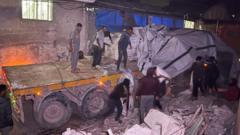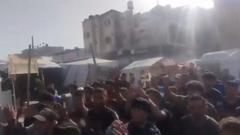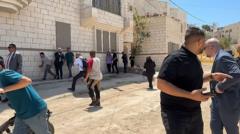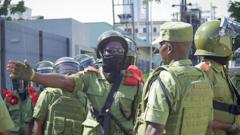For the third consecutive day, protests have erupted across southern Gaza, with demonstrators expressing their grievances against Hamas. Despite the risks associated with criticizing the armed group, citizens have taken to the streets demanding an end to the ongoing conflict and a change in leadership. Amid ongoing military actions and civilian displacement, discontent seems to be surging in a region long dominated by Hamas.
Rising Dissent: Palestinians Protest Against Hamas in Southern Gaza
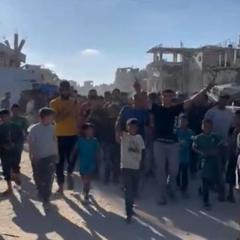
Rising Dissent: Palestinians Protest Against Hamas in Southern Gaza
Large-scale protests against Hamas take center stage in southern Gaza as public frustration mounts and calls for an end to the group's governance resound.
Thousands of Palestinians have gathered in the streets of southern Gaza for a third day, voicing their discontent towards Hamas and demanding an end to the conflict in the region. Demonstrators were caught on video passionately chanting, "Out! Out! Out! All of Hamas, out!" as the protests spread, fueled by an increasing wave of dissatisfaction with the armed group's leadership. The protests, which began on Monday, saw young activists at the forefront, who were later joined by locals seeking food from community kitchens.
The protests followed controversial remarks made by Hamas official Sami Abu Zuhri, which ignited further outrage. His assertion that the war with Israel is "eternal" and that Hamas would continue to endure drew sharp criticism, with protesters in Khan Younis directing their fury at him for what they perceive as the exploitation of their suffering.
Activists report that while anti-Hamas sentiment has been growing in northern Gaza, the group's strong influence in the south has previously suppressed dissent until now. With access for international journalists severely limited amid ongoing airstrikes and evacuation orders, the situation remains difficult to fully assess from outside the region.
One protester, referred to as Alaa for safety reasons, expressed the dire circumstances many face and their collective decision to push back against Hamas. Having experienced displacement multiple times during the war, he said, “The people do not care any more about Hamas' attempts to suppress their voice because they are literally dying from hunger, evacuation, and the bombings.” He emphasized that while Hamas might be currently present, the notion of resistance is not confined to the group.
Publicly opposing Hamas, however, carries substantial risks. Alaa recounted past instances of brutal crackdowns against dissenters, revealing a recent case where a young man was killed following participation in anti-Hamas protests. Despite such threats, the mounting humanitarian crisis, coupled with the harsh realities of life under constant bombardment, seems to be galvanizing public sentiment against Hamas's rule.
Legal advocate and protest movement co-founder Moumen al-Natour highlighted the toll of ongoing displacement, stating that “the fatigue, effort and cost of displacement is pushing people to revolt against Hamas.” The United Nations reports the displacement of over 57,000 individuals since mid-May due to conflict escalation, with total casualties in Gaza nearing 53,000 according to Hamas-run health officials.
The recent unrest arises within a complex backdrop of escalating violence, following Hamas’s October 7 attack on Israel that resulted in significant loss of life, prompting a sustained military response from Israel aimed at dismantling Hamas's capabilities. As the humanitarian crisis deepens, the dynamics within Gaza appear to shift, potentially signaling a pivotal moment in the ongoing struggle between the populace and their ruling authority.


